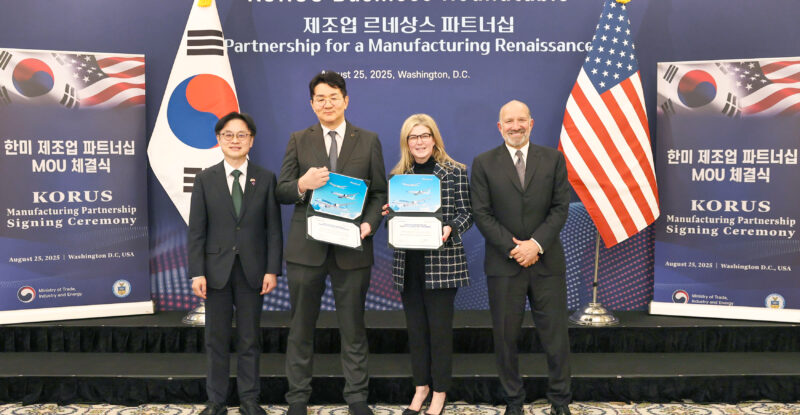 Korean Air announced its intent to purchase 103 next-generation aircraft from Boeing, 19 spare engines from GE Aerospace and CFM International, and a comprehensive engine maintenance program with GE Aerospace on August 25.
Korean Air announced its intent to purchase 103 next-generation aircraft from Boeing, 19 spare engines from GE Aerospace and CFM International, and a comprehensive engine maintenance program with GE Aerospace on August 25.
The total investment is valued at approximately USD 50 billion (KRW 70 trillion).
This includes USD 36.2 billion (KRW 50 trillion) for Boeing aircraft, USD 690 million (KRW 1 trillion) for 19 spare engines and an additional USD 13 billion (KRW 18.2 trillion) for the 20-year engine maintenance service contract.
The agreements were formalized on August 25 at a signing ceremony in Washington D.C, attended by Walter Cho, Chairman and CEO of Korean Air and Hanjin Group; Stephanie Pope, President and CEO of Boeing Commercial Airplanes; and Russell Stokes, President and CEO of Commercial Engines & Services at GE Aerospace.
The aircraft purchase order includes 20 Boeing 777-9s, 25 Boeing 787-10s, 50 Boeing 737-10s, and eight Boeing 777-8F freighters. The aircraft are scheduled for phased delivery through the end of 2030.
This strategic aircraft acquisition is a proactive measure to support Korean Air’s long-term growth following its integration with Asiana Airlines. The airline’s investment plan extends into the mid-to-late 2030s, and reflects delivery delays affecting the global aviation industry.
Korean Air’s fleet strategy will standardize its long-term operations around five highly-efficient aircraft families: the Boeing 777, 787 and 737, along with the Airbus A350 and A321-neo. This move is expected to ensure a stable capacity growth, achieve economies of scale through fleet simplification, enhance fuel efficiency, reduce carbon emissions, and improve the overall customer experience.
In addition to the new aircraft, Korean Air will acquire 11 spare engines from GE Aerospace and eight from CFM International. The airline will also receive 20 years of engine maintenance service from GE Aerospace for 28 aircraft, representing a significant investment in operational stability and safety.
Korean Air has a long history of fostering close ties between the two countries, beginning with the opening of its first U.S. cargo route (Seoul – Tokyo – Los Angeles) in April 1971 and its first passenger route (Seoul – Tokyo – Honolulu – Los Angeles) in April 1972. This cooperation continues today through its trans-Pacific joint venture with Delta Air Lines.
This deal is a strategic choice to strengthen Korean Air’s partnership with the U.S. aviation industry. Korean Air currently collaborates closely with a broad range of U.S.-based aviation companies, including Pratt & Whitney, General Electric (GE), Hamilton Sundstrand and Honeywell.
As Korea’s leading flag carrier, Korean Air will continue to serve as a vital bridge between the two countries. This strategic investment in the U.S. market will further strengthen the airline’s operational capabilities and global competitiveness, and foster robust commercial ties that will drive sustained growth.
About Korean Air
Serving the world for more than 55 years, Korean Air is one of the world’s top 20 airlines, carrying more than 23 million passengers in 2024. With its global hub at Incheon International Airport (ICN), the airline serves 117 cities in 40 countries on five continents with a modern fleet of 161 aircraft and over 20,000 professional employees.
Korean Air’s outstanding performance and commitment to the highest level of safety and customer service has widely been recognized. The airline has been granted numerous awards including a 5-star airline rating from Skytrax as well as Airline of the Year from both Air Transport World and Airline Ratings. Korean Air is a founding member of the SkyTeam airline alliance, and has grown into one of the largest transpacific airlines through its joint venture with Delta Air Lines.
Featured image credited to Korean Air










